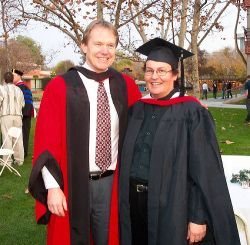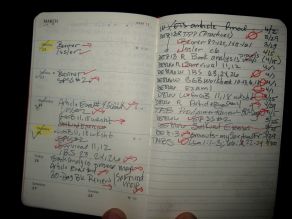INTELLECTUAL HEALTH
 I have been a graduate student for ten years, earning a Master of Divinity and a Master of Theology (at least honors in both) during that time, all while working a full time job and serving in ministry. I am now working toward a Doctor of Philosophy. I understand busy.
I have been a graduate student for ten years, earning a Master of Divinity and a Master of Theology (at least honors in both) during that time, all while working a full time job and serving in ministry. I am now working toward a Doctor of Philosophy. I understand busy.
Pulling this off has required me to learn how to schedule time for intellectual work. My normal “working” weekday begins at 5 AM and ends around 8 PM. A full day of paid work is usually placed in there somewhere (with a bit of gracious schedule flexibility for classes: thank you bosses). I have learned to fit my intellectual work to my crazy schedule, mostly through trial and error. In this post, I describe some of what I have learned so far. I hope it helps.
Planning individualized work schedule requires investigation and a bit of introspection.
Investigation
Determine time requirements by looking at the work load of and due dates for the projects to be scheduled.
Work load is a combination of two features: intensity and size. Intensity is based on the nature of the work. Studying a short article should take more time and energy than skimming an entire book. Writing a well-researched, tightly argued essay should take more energy than a reflection, but it may not take more time.
Size is based on the number of pages to be read, studied, or written. While each person works at a different speed, there are some helpful rules of thumb for time-to-completion.
- Careful reading requires at least 4 minutes per page for the average reader. This means you can cover fifteen pages in an hour. Obviously, not everything can be read carefully: we would never get it all done.
- Thoughtful writing takes at least 60 minutes per page for the average writer. A paper requiring much research or thought may take longer.
Your speed may vary, but these are good starting times.
When planning intellectual work with due dates, start at the due date and work backwards. Include all assignments when deciding when to start. A Gantt chart is helpful here. Remember to add a bit of margin; stuff happens.
Introspection
The most careful investigation is useless without equally careful introspection. Availability and capacity are the two key issues. Availability is your actual schedule, not the one you wish you had. Capacity is the way your brain works.
Fit intellectual work into the actual available space. It is a sad truth, but most of us cannot–or will not–carve additional time slots into our schedules. Despite our full schedules, most of us have available space, for the definition of available includes the caveat that if you have time for television or video/online games, then you have time for intellectual work.
Plan intellectual work for times when you are able to think well. Planning intellectual work where you have little capacity is frustrating and futile. Find out whether you are a morning or evening person using the morningness-eveningness scale (via wikipedia, see n. 5) and plan accordingly.
 Record the plan in something you carry with you. In the past, I used my Treo 750, but the linearity of it became irritating. I now use a Moleskine Weekly Notebook
Record the plan in something you carry with you. In the past, I used my Treo 750, but the linearity of it became irritating. I now use a Moleskine Weekly Notebook. Since I am a student, I plan out the entire semester in advance.
Implementation
Even if you are a morning person, pack your supplies the night before. There is no reason to add more stress.
Record your progress on the written plan. Do the day’s work according to the schedule and priorities already determined, and then check things off as they are completed. Checking something off the list is quite satisfying.
Review the plan at the end of the day and make the needed adjustment to the following day. If you start to get further and further behind, adjust the time requirements for your projects and change the plan accordingly. Repeat the process. Another caveat: plan rest and fun as well as work. Health requires it.
Cut out activities that are lower on the priority list. Sometimes planning alone is insufficient and drastic steps must be taken. I have needed to take a hard look and have the courage chop. You might need to do this as well.
Intellectual work in very important, but relationships hold the trump card. People are NEVER lower on the list. They come first. This continues to be a tough lesson.

